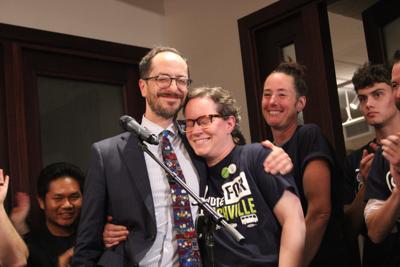Metropolitik is a recurring column featuring the Scene’s analysis of Metro dealings.
A few dull red yard signs still dot Davidson County neighborhoods a week after Election Day. In block letters, the plain message — “VOTE NO TRANSIT TAX” — blares into the void. For months, these rare lawn decorations were the only visible opposition to Mayor Freddie O’Connell’s proposed, and now passed, sales tax hike dedicating funding to the city bus system and roadway upgrades to modernize stoplights and sidewalks.
Advocacy leaders lay grassroots groundwork for the mayor’s Nov. 5 transit referendum
On the pro-referendum side was a rare alignment of pretty much everyone else. Downtown business interests raised millions for the transit campaign, spending as the Nashville Moves Action Fund, a federally regulated 501(c)4 that successfully avoided disclosing specific donors until after votes were counted. The majority of the Metro Council became vocal advocates after ushering the plan through the chamber over the summer. Two exceptions — District 26’s Courtney Johnston and District 2’s Joy Kimbrough — made brief public efforts to contest it. Popular advocacy organizations Stand Up Nashville, the Tennessee Immigrant and Refugee Rights Coalition and The Equity Alliance banded together as the SHIFT coalition to canvas politically engaged constituencies, briefly joining the business lobby they’ve historically mobilized against. O’Connell used the podium to tell and retell his own transit folktale about ditching his car to save money as a young Nashvillian. There were flashy press conferences, including a fairgrounds expo in front of a signature purple WeGo bus.
The decisive electoral victory, in which “FOR” beat “AGAINST” nearly 2 to 1, has already put gears in motion for a transit makeover that will last more than a decade. O’Connell is hiring a new “Choose How You Move” chief program officer for $265,000 to $295,000 annually — Metro’s top salary tier. The ballot language approved direct tax-to-program funding, the legal reason why this went in front of voters, securing “dedicated funding” that O’Connell has wanted for WeGo since his time on the Metro Transit Authority Board. That accounting shift also means the council won’t have the same pressure to allocate funding for WeGo every year, freeing up operating-budget dollars.
O’Connell’s victory also boosts his personal brand. He was once a wonky councilmember considered an outside candidate to unseat then-Mayor John Cooper, who eventually declined to seek reelection. But the political dominoes have consistently fallen in O’Connell’s favor since he announced his candidacy in spring 2022. Thirteen months into governing, he’s scored a substantial victory with most of the city on his side. Public messaging has shifted away from the construction continuing on the East Bank and a partially publicly funded $2.1 billion Titans stadium, which emerged as a singular priority for Cooper in his waning days. O’Connell handed the massive development project over to former Councilmember Bob Mendes, now a mayor’s office executive. The council confirmed Scott Tift and Nathaniel Carter as the first two members of the new East Bank Development Authority last week.
At a press conference the day after the vote, O’Connell started laying out next steps.
Boosters disclose $530K ad push against grassroots opposition
“The easiest thing we have to get started on are some sidewalks,” he said. “We started multiple conversations with the Finance Department today to see what will be immediately eligible for funding and how quickly we could, for instance, go to ground on some of this. Sidewalks in the easiest places to build them. We think on all three — sidewalks, signals and service — you’ll start to see improvements in year one.”
The transit improvement plan that passed through the council estimated $3.1 billion in capital spending, a massive bill for projects that will span the county. Capital spending means new stuff — it also means annoying construction, but visible improvements that O’Connell will point to when voters ask what he’s done for them lately.
Three days after the vote, at the mayor’s weekly press roundtable, O’Connell hinted at even more ambition, referencing affordable housing as transit’s complement.
Voters give mayor’s $3.1 billion plan the green light
“Metro Housing division will also be releasing their Unified Housing Strategy in the coming weeks that will set goals, outline strategies and provide policy and program recommendations to advance access to affordable, safe and stable housing for more Nashvillians,” O’Connell told reporters. “Every bit helps. We had early established affordable housing and transportation as two of our top priorities. Moving forward, as we try to address cost of living in Nashville, we’ll be expanding that affordability tool kit.”
Once the office fills an executive role over transit, expect conversation to shift toward progressive housing policy. In the early spring, Councilmembers Quin Evans Segall and Rollin Horton pushed a slate of zoning- and codes-related reform with mixed results. Members hit fierce community opposition to certain measures that would have upzoned single-family neighborhoods. Both Horton and Segall tell the Scene they will continue to push policy that facilitates greater residential density.
At a panel on homelessness last week, District 14 Councilmember Jordan Huffman said the chamber has a lingering appetite for zoning reform.
“Expect more policy related to zoning reform in the coming year,” Huffman told the crowd at Vine Street Christian Church. Fellow legislators Burkley Allen, a councilmember at-large, and Angie Henderson, vice mayor, sat in the pews.








